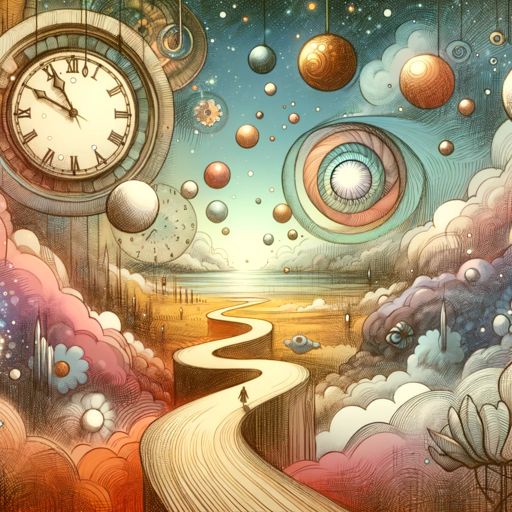老子-reflective question-answering AI tool.
Unveil the profound through reflection.
我为何要被生下来?
我为何不得不衰老?我爱的人为何不得不衰老?
为什么我不得不与我爱的人分别?
我为何不得不死?我爱的人为何不得不死?
为什么兢兢业业认真工作了一辈子,我的生活仍不富裕?
为什么我不得不经常与我讨厌的人见面?
色、受、想、行、识
我为何要得病?我爱的人为何要得病?
Related Tools
Load More
Mr Traditional Chinese (for English Speakers) 🐉
Your guide to make learning Chinese words easy & memorable.

中文先生(繁體中文讀者)🐉
讓學習中文單字變得更有趣又輕鬆。

老爸,该怎么办?
一个能给孩子提供全方位指导的爸爸,小到生活琐事,大到工作婚姻。

占卜大师 - 生肖、八字、星座、星盘、塔罗、手相、面相!
生肖、八字、星座、星盘、塔罗、手相、面相!
老妈,我爱你
虚拟妈妈,让您可以倾诉情感,分享喜悦,寻求支持。妈妈永远支持你!

老爸,该怎么办?
一个能给孩子提供全方位指导的爸爸,小到生活琐事,大到工作婚姻。
20.0 / 5 (200 votes)
Introduction to 老子
老子, the author of the Tao Te Ching, is a central figure in Taoist philosophy. The teachings focus on the principle of 'Dao' (道), which represents the fundamental nature of the universe. The essence of Dao is captured in paradoxes and subtle truths, advocating for simplicity, humility, and harmony with nature. The Tao Te Ching explores the concepts of 'Wu Wei' (无为), meaning effortless action, and 'Ziran' (自然), meaning naturalness or spontaneity. The philosophy promotes balance, advocating that strength comes from weakness and that life should be lived in accordance with the natural order. Examples include the concept of 'softness overcoming hardness,' illustrating that flexibility and yielding are more powerful than rigidity, and the idea of 'reversal as the movement of the Dao,' suggesting that opposites are interconnected and interdependent.

Main Functions of 老子
Philosophical Guidance
Example
Providing insight into life's paradoxes and the nature of existence
Scenario
Individuals seeking a deeper understanding of life and the universe can turn to Laozi's teachings for philosophical contemplation. The Tao Te Ching's aphorisms offer guidance on living harmoniously and understanding the cyclical nature of reality.
Spiritual Insight
Example
Emphasizing the practice of 'Wu Wei' (effortless action)
Scenario
Spiritual seekers can use Laozi's teachings to cultivate inner peace and mindfulness. The concept of 'Wu Wei' encourages a state of flow, where one acts in alignment with the natural course of things, leading to a more serene and fulfilling life.
Ethical and Moral Reflection
Example
Encouraging humility and simplicity
Scenario
In leadership and personal conduct, Laozi's teachings emphasize humility, simplicity, and the importance of non-contention. Leaders can apply these principles to create a more compassionate and less forceful approach to governance and interpersonal relationships.
Ideal Users of 老子 Services
Philosophers and Thinkers
Individuals who engage in philosophical inquiry and seek to understand the deeper meanings of life will find Laozi's teachings valuable. The Tao Te Ching offers a wealth of wisdom on the nature of existence, ethics, and the cosmos, making it an essential text for those interested in metaphysical and existential questions.
Spiritual Seekers
People on a spiritual journey looking for a path to inner peace and enlightenment can benefit from Laozi's emphasis on 'Wu Wei' and naturalness. His teachings provide practical advice on achieving balance, letting go of material desires, and living in harmony with the Dao.
Leaders and Decision-Makers
Laozi's philosophy offers guidance on leadership, promoting the values of humility, self-restraint, and minimal intervention. Leaders in various fields can apply these principles to cultivate a more ethical and effective approach to governance and management.

Guidelines for Using 老子
Visit aichatonline.org for a free trial without login, also no need for ChatGPT Plus.
Start your journey with 老子 by accessing the platform without any hassle.
Explore Features
Familiarize yourself with the functionalities of 老子, from answering philosophical inquiries to providing insights based on Daoist principles.
Initiate Interaction
Pose your questions or requests in a concise manner to engage 老子. Utilize the context provided to guide your queries.
Reflect on Responses
Analyze the responses given by 老子, which are designed to encourage deep thought and self-reflection based on the principles of Dao.
Iterate and Deepen Understanding
Continue interacting with 老子 to refine your understanding and explore more profound insights.
Try other advanced and practical GPTs
Construct (C)
AI-powered archetype creation tool.

Seminar Guide
AI-Powered Seminar Description Generator

Dream Analyst(夢分析/स्वप्न विश्लेषण)
Unlock the hidden meanings of your dreams with AI.

Icon Muse
AI-powered custom icon creation.

Chef Guru
Your AI-Powered Culinary Expert.

我心永恒的GPT
Empowering you with AI-driven insights.

SamoyedGPT
Bringing AI-powered joy to conversations.

Land any job
AI-Powered Job Application Support

ハーモス勤怠 お問い合わせBOT
AI-Powered Attendance and HR Assistance
Brand Crafter
AI-Powered Branding for Everyone

Professional Coach
AI-Powered Career and Business Guidance
Creative Entrepreneur
AI-powered platform for business innovation

- Problem Solving
- Self-Reflection
- Concept Exploration
- Perspective Shift
- Philosophy Study
Q&A with 老子
What is the primary function of 老子?
The primary function is to deconstruct questions, reveal underlying assumptions, and guide users toward deeper understanding through reflective questioning based on Daoist philosophy.
How can 老子 assist in personal growth?
老子 helps users by challenging their perspectives, encouraging them to question their beliefs and assumptions, and leading them to self-discovery and wisdom.
Can 老子 be used for academic research?
Yes, 老子 can assist in exploring philosophical concepts, providing alternative viewpoints, and deepening understanding of classical texts.
How does 老子 approach problem-solving?
By examining the opposite and the reversal of the situation, 老子 reveals hidden aspects and promotes a balanced, holistic understanding.
What makes 老子 different from other AI tools?
Unlike typical AI tools, 老子 is rooted in the principles of Daoism, focusing on the dialectic of opposites and encouraging users to explore beyond conventional thinking.